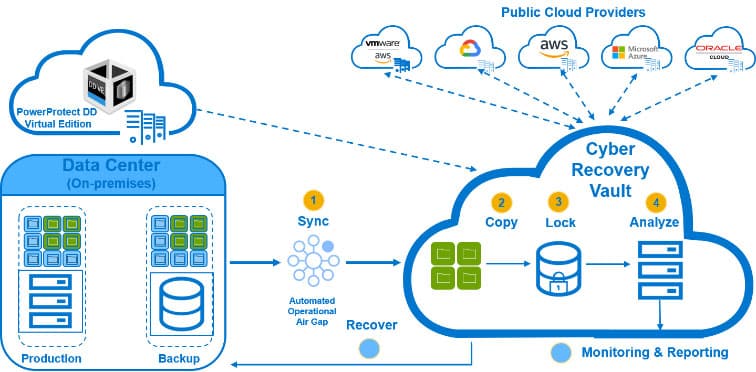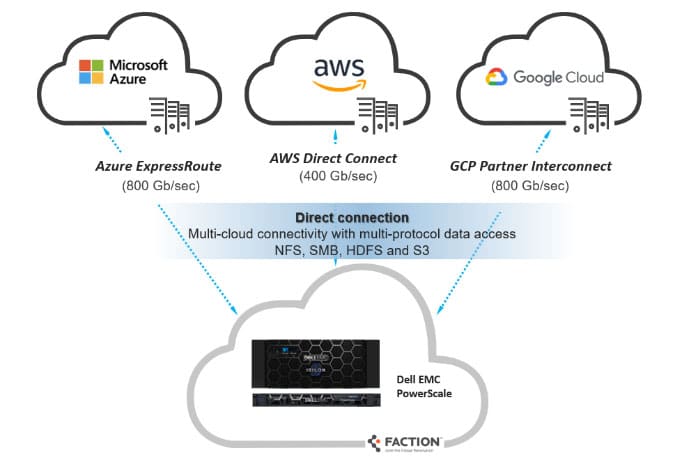Storage Review | Dell Technologies Multi-Cloud Storage, Data Protection Updated

Today Dell Technologies’ multi-cloud storage and data protection portfolios received updates that aim to hit the popular buttons of protection, simplicity, and flexibility. The new storage and protection revolve around the Power- line, specifically PowerProtect for Multi-cloud and PowerScale for Multi-cloud.
In recent years it is commonly known that data is the new gold rush or at least the insights that can be garnered from the data. Another huge shift has been the public cloud and all the benefits that can come from them without having to buy all the infrastructure upfront. Also, it introduces new applications immediately. While each of the major clouds, AWS, Azure, Google Cloud, and Oracle Cloud, has particular benefits, there is still often a need to use a private cloud or use multiple clouds. This multi-cloud approach brings several benefits and several issues that come around storage and protection that Dell is looking to tackle a bit further today.
The company already has both storage and protection for the multi-cloud in the Dell Technologies Cloud Storage for Multi-cloud and Dell Technologies Cloud PowerProtect for Multi-cloud. These solutions are brought about in part by Dell’s collaboration with Faction. Today they are taking their already established products and enhancing them.
Dell Technologies Cloud PowerProtect for Multi-cloud

First up is data protection. Ransomware is on the rise once more (with the uptick in remote work giving the attackers easier targets to pick off). With end devices and several clouds being used to carry out the work, protecting it is a bit more difficult than it used to be. PowerProtect for Multi-cloud is a solution created to quell the fears of protecting something so complex.
To bump up security, the company is adding security from its Dell EMC PowerProtect Cyber Recovery while also introducing cloud-like simplicity and economics. Customers will have access to an air-gapped and secure Cyber Recovery vault in a cloud-adjacent Faction-powered data center. The added features also including data immutability and CyberSense intelligent analytics for data recovery. If an attack happens, users can recover their data from the Cyber Recovery vault to their data center or one of the major clouds of their choice.
Dell EMC PowerScale for Multi-cloud

For PowerScale customers looking for more data protection, they can now have full cloud-enabled disaster recovery by taking advantage of Superna Eyeglass DR Manager. This DR manager is a replication orchestrater and helps with metadata management. Superna leverages the cloud for disaster recovery allowing for continuous operations at a lower cost. Superna also allows users to replicate data to a cloud-adjacent Faction-powered data center. The Superna Eyeglass DR Manager also has an enterprise-grade feature-set that includes one button failover, flexible SyncIQ scheduling, continuous readiness monitoring, DR testing, data loss exposure analysis, reporting, and more.
PowerScale for Multi-cloud is in itself a data repository for multiple clouds. It allows users to take advantage of its compute resources across clouds. The compute resources can be used simultaneously to process data sets, not transferred from one cloud to the next, but accessed when needed. This increases speed while reducing both cost and complexity. Recently Dell enlisted ESG to verify the performance and functionality of PowerSclae for Multi-Cloud. When reports are commissioned they tend to be a bit rosy and this is the case here, still impressive even when viewed through that lens, ESG found:
- Massive scale: GPU compute cores were used simultaneously across the three clouds and scaled up to one million cores, illustrating the ease of tapping dynamically into compute resources of multiple clouds. While spot instances are offered by public clouds at a discount, there is no guarantee of their availability. The workload was moved between clouds to take advantage of the availability and low cost of spot instances.
- Extreme performance: The solution can reach up to 2 Tb/s simultaneous multi-cloud throughput via multi-protocol data access on PowerScale for NFS, SMB, HDFS, and S3. The self-service bandwidth re-provisioning enabled the re-allocation of the supported service bandwidth between the clouds to ensure that even the most demanding workload gets the performance that it needs.
- Dramatic storage cost savings: Storage costs were as much as 89% lower with PowerScale for Multi-cloud, when compared to managing three copies of data across three clouds.